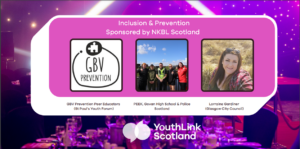Sponsored by No Knives Better Lives
Youth workers are ideally placed to identify and address risk-taking behaviour, ensuring young people understand the consequences of their actions and the implications for the people they care for. Let’s meet our finalists!

The Gender-based Violence Prevention Peer Educators (GBVPPEs) from St Paul’s Youth Forum consist of a core group of dedicated young people who have a passion for reducing and preventing violence against women and girls within the Blackhill and Provanmill community.
Established in 2019, the group dedicated itself to exploring what peer education was and how they could become peer educators as individuals by working alongside the Scottish Peer Education Network.
Since then, the GBVPPEs have been committed to using peer education as a tool to include and educate other young people and the wider community, creating a suite of resources to support learning around key GBV issues.
A 20-minute audio gives a provides an overview of the group’s work, and includes an insightful interview with Linda Thompson of Glasgow Women’s Support Project discusses why youth workers should be talking about porn and the link between positive masculinity and porn.
Other resources such as an interactive ice-breaker game for youth workers to use to establish a benchmark of knowledge around GBV in workshops, and a range of Don’t Drop the Ball on Relationships posters have been created to provide a range of fun and engaging tools to discuss important issues around GBV.
Inclusion and prevention are at the heart of PEEK’s Thrive programme, which supports young people aged 12+ to support their relationships and connections, boost their health and wellbeing and improve their life chances.
In 2022, PEEK delivered an intervention project with Govan High School for young people who were not engaging with the school and were already known to Police Scotland.
Working in partnership with the school’s leadership, PEEK planned and delivered a 16-week tailored programme. Using the Police Scotland database, the team looked at the crimes most commonly committed in the area and designed workshops around knife crime, sectarianism, gambling, fire safety, gender-based violence, hate crime and substance misuse.
By the end of the project, police interventions with young people were down by 82%, school ‘demerits’ were down 75% and increase in afterschool clubs increased by 55%. On top of this, young people participating in the project achieved 36 Dynamic Youth and Hi-5 awards.
One young person said, “I have learned about knife crime and how powerful crimes can be and how this can hurt not just myself but others”. Another said, “my goal [when I started the project] was to stop smoking and fighting. I have not been in any fights, and I also don’t smoke now.”
Working within Glasgow City Council’s Neighbourhoods, Regenerations & Sustainability Community Justice Team, Lorraine has played a vital role in healing community wounds through a restorative justice programme.
When young people have been causing harm in the community, Lorraine is able to bring them together with off-duty local policing teams to break down the barriers between police and young people. The group then takes part in restorative group work sessions to develop empathy, take responsibility and promote positive citizenship.
Through this process, young people come face to face with community members to hear each other’s perspectives, and can begin to develop and repair relationships, promoting sustainable positive community engagement.
One of Lorraine’s’ key strengths is engaging young people on the programme and her retention rates for the programme are almost 100%. Some of the young people on the programme are not engaging in education and some not engaging in any community supports and are some of the most marginalised young people in their community. The aim by the end of the programme is to engage the young people back into education, youth work and community-based supports.
Dylan McNeil said: “I really enjoyed the programme which Lorraine had put together. It showed me the consequences of my actions, and I found it worthwhile going forward, and helped me understand on how to get onto the right path in life.”